Healthcare Policy and Aging Population in Hong Kong: A Review
VerifiedAdded on 2023/04/21
|9
|2545
|163
Report
AI Summary
This report examines the challenges faced by Hong Kong's healthcare system due to its aging population, focusing on increased healthcare expenditure and the burden on the younger working population. It highlights the prevalence of chronic diseases and disabilities among the elderly, leading to higher costs and strain on healthcare resources. The report proposes solutions such as increasing tax rates, raising the retirement age, promoting healthcare facilities, and encouraging healthy lifestyles. It also discusses the opportunities presented by China's 14th five-year plan to transform Hong Kong into an age-friendly society by enhancing health insurance coverage and geriatric care departments. The report concludes by emphasizing the need for policy redevelopment to address the growing demands of an aging population and ensure sustainable healthcare and economic conditions.
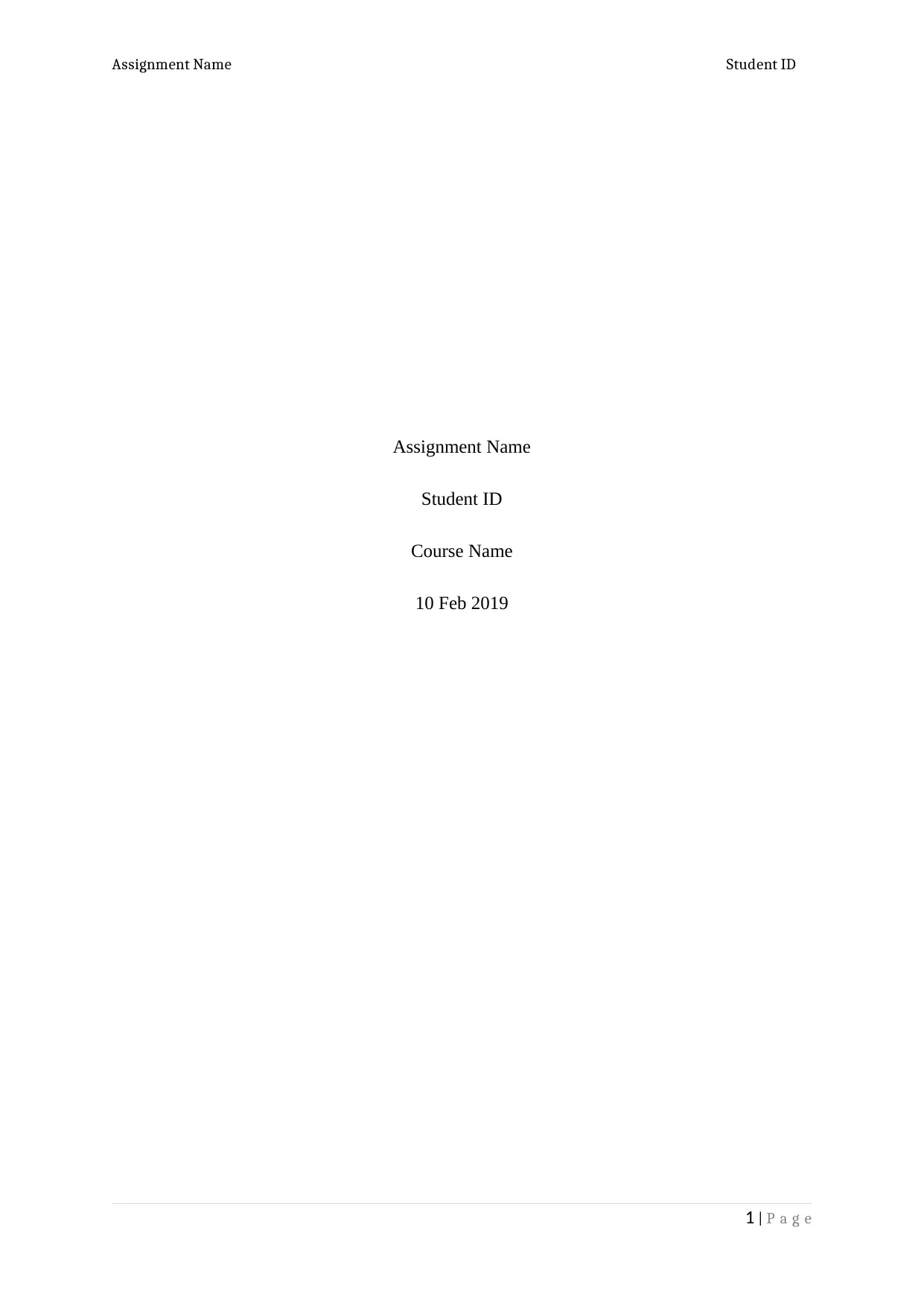
Assignment Name Student ID
Assignment Name
Student ID
Course Name
10 Feb 2019
1 | P a g e
Assignment Name
Student ID
Course Name
10 Feb 2019
1 | P a g e
Paraphrase This Document
Need a fresh take? Get an instant paraphrase of this document with our AI Paraphraser
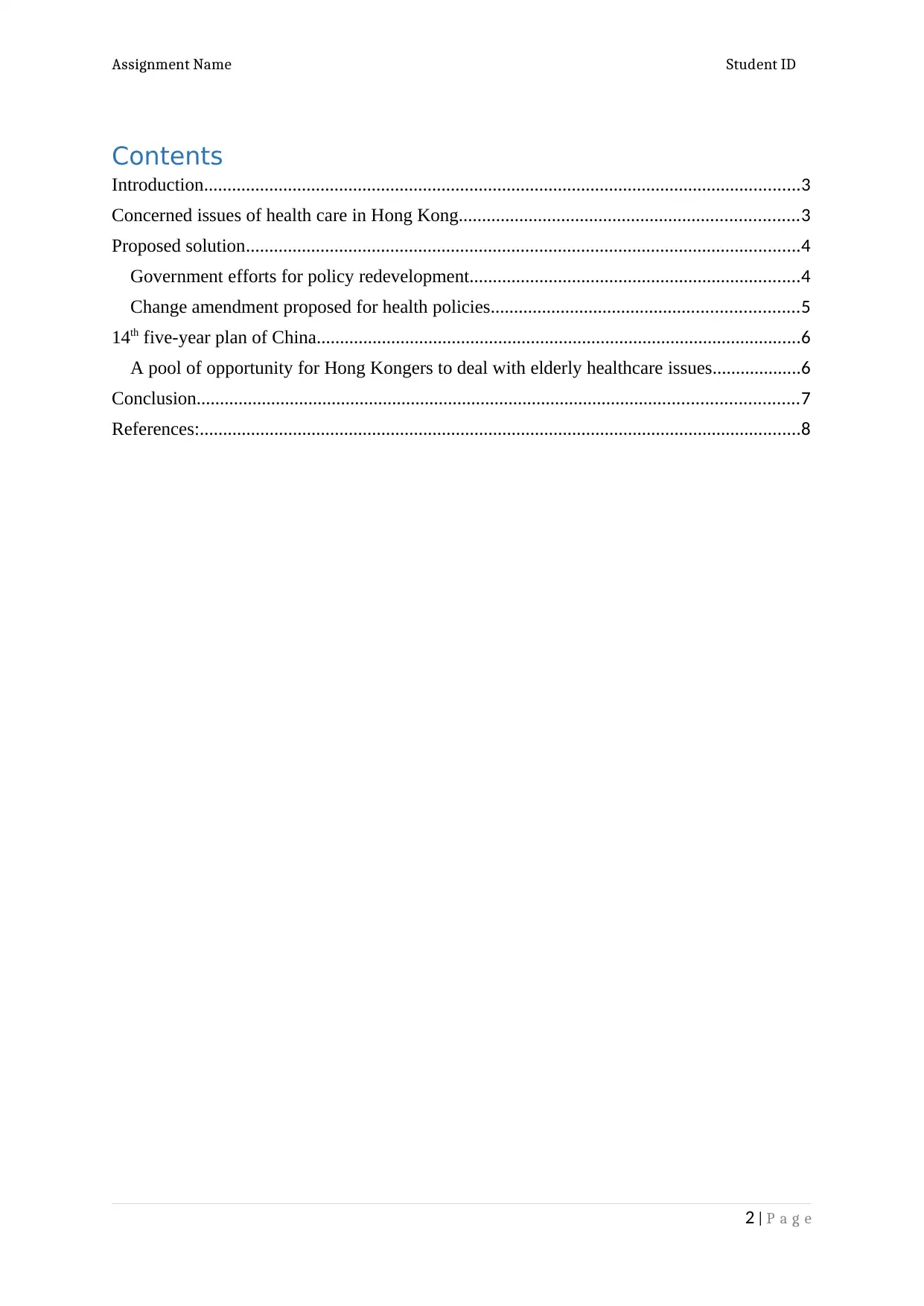
Assignment Name Student ID
Contents
Introduction................................................................................................................................3
Concerned issues of health care in Hong Kong.........................................................................3
Proposed solution.......................................................................................................................4
Government efforts for policy redevelopment.......................................................................4
Change amendment proposed for health policies..................................................................5
14th five-year plan of China........................................................................................................6
A pool of opportunity for Hong Kongers to deal with elderly healthcare issues...................6
Conclusion.................................................................................................................................7
References:.................................................................................................................................8
2 | P a g e
Contents
Introduction................................................................................................................................3
Concerned issues of health care in Hong Kong.........................................................................3
Proposed solution.......................................................................................................................4
Government efforts for policy redevelopment.......................................................................4
Change amendment proposed for health policies..................................................................5
14th five-year plan of China........................................................................................................6
A pool of opportunity for Hong Kongers to deal with elderly healthcare issues...................6
Conclusion.................................................................................................................................7
References:.................................................................................................................................8
2 | P a g e
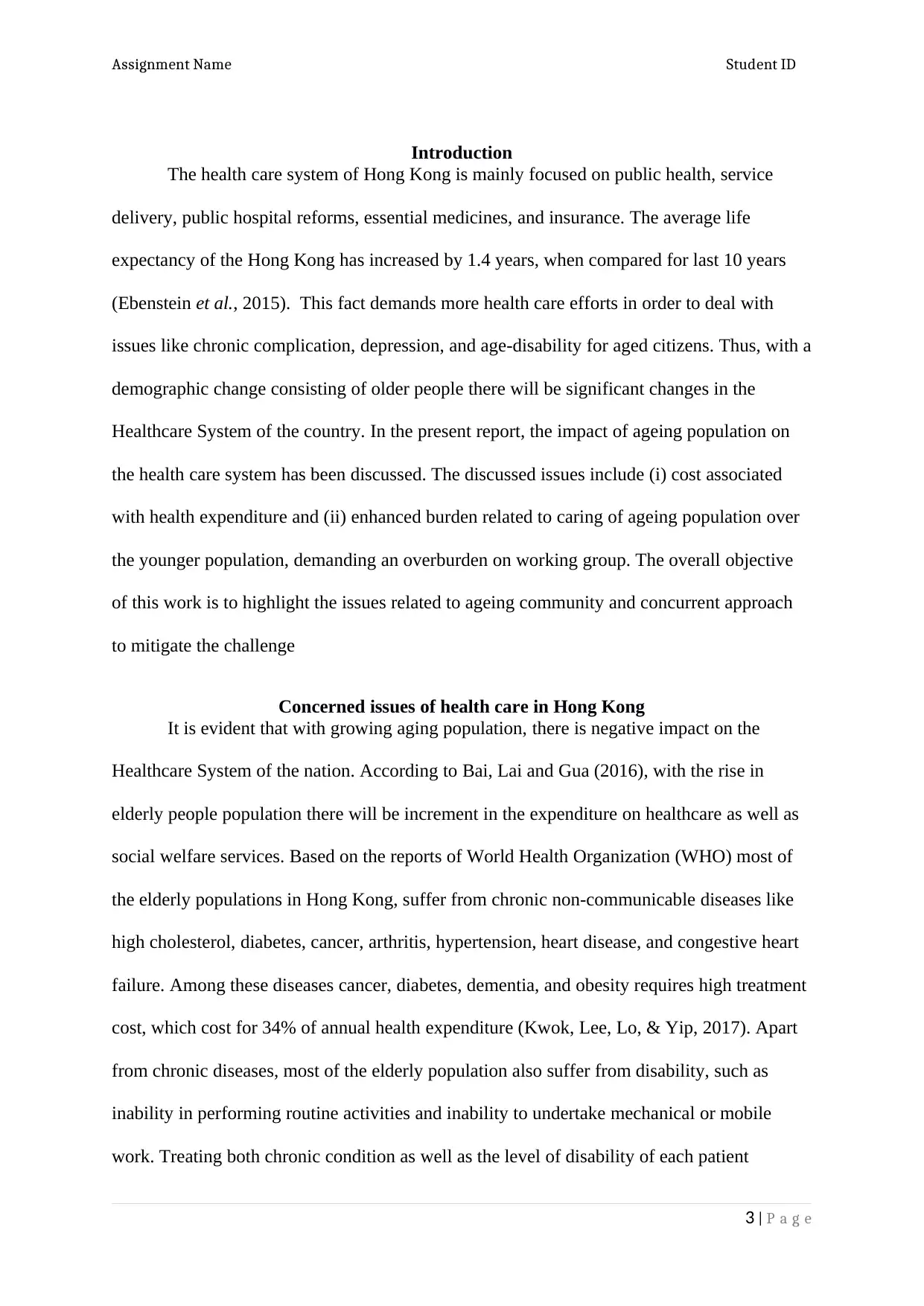
Assignment Name Student ID
Introduction
The health care system of Hong Kong is mainly focused on public health, service
delivery, public hospital reforms, essential medicines, and insurance. The average life
expectancy of the Hong Kong has increased by 1.4 years, when compared for last 10 years
(Ebenstein et al., 2015). This fact demands more health care efforts in order to deal with
issues like chronic complication, depression, and age-disability for aged citizens. Thus, with a
demographic change consisting of older people there will be significant changes in the
Healthcare System of the country. In the present report, the impact of ageing population on
the health care system has been discussed. The discussed issues include (i) cost associated
with health expenditure and (ii) enhanced burden related to caring of ageing population over
the younger population, demanding an overburden on working group. The overall objective
of this work is to highlight the issues related to ageing community and concurrent approach
to mitigate the challenge
Concerned issues of health care in Hong Kong
It is evident that with growing aging population, there is negative impact on the
Healthcare System of the nation. According to Bai, Lai and Gua (2016), with the rise in
elderly people population there will be increment in the expenditure on healthcare as well as
social welfare services. Based on the reports of World Health Organization (WHO) most of
the elderly populations in Hong Kong, suffer from chronic non-communicable diseases like
high cholesterol, diabetes, cancer, arthritis, hypertension, heart disease, and congestive heart
failure. Among these diseases cancer, diabetes, dementia, and obesity requires high treatment
cost, which cost for 34% of annual health expenditure (Kwok, Lee, Lo, & Yip, 2017). Apart
from chronic diseases, most of the elderly population also suffer from disability, such as
inability in performing routine activities and inability to undertake mechanical or mobile
work. Treating both chronic condition as well as the level of disability of each patient
3 | P a g e
Introduction
The health care system of Hong Kong is mainly focused on public health, service
delivery, public hospital reforms, essential medicines, and insurance. The average life
expectancy of the Hong Kong has increased by 1.4 years, when compared for last 10 years
(Ebenstein et al., 2015). This fact demands more health care efforts in order to deal with
issues like chronic complication, depression, and age-disability for aged citizens. Thus, with a
demographic change consisting of older people there will be significant changes in the
Healthcare System of the country. In the present report, the impact of ageing population on
the health care system has been discussed. The discussed issues include (i) cost associated
with health expenditure and (ii) enhanced burden related to caring of ageing population over
the younger population, demanding an overburden on working group. The overall objective
of this work is to highlight the issues related to ageing community and concurrent approach
to mitigate the challenge
Concerned issues of health care in Hong Kong
It is evident that with growing aging population, there is negative impact on the
Healthcare System of the nation. According to Bai, Lai and Gua (2016), with the rise in
elderly people population there will be increment in the expenditure on healthcare as well as
social welfare services. Based on the reports of World Health Organization (WHO) most of
the elderly populations in Hong Kong, suffer from chronic non-communicable diseases like
high cholesterol, diabetes, cancer, arthritis, hypertension, heart disease, and congestive heart
failure. Among these diseases cancer, diabetes, dementia, and obesity requires high treatment
cost, which cost for 34% of annual health expenditure (Kwok, Lee, Lo, & Yip, 2017). Apart
from chronic diseases, most of the elderly population also suffer from disability, such as
inability in performing routine activities and inability to undertake mechanical or mobile
work. Treating both chronic condition as well as the level of disability of each patient
3 | P a g e
⊘ This is a preview!⊘
Do you want full access?
Subscribe today to unlock all pages.

Trusted by 1+ million students worldwide
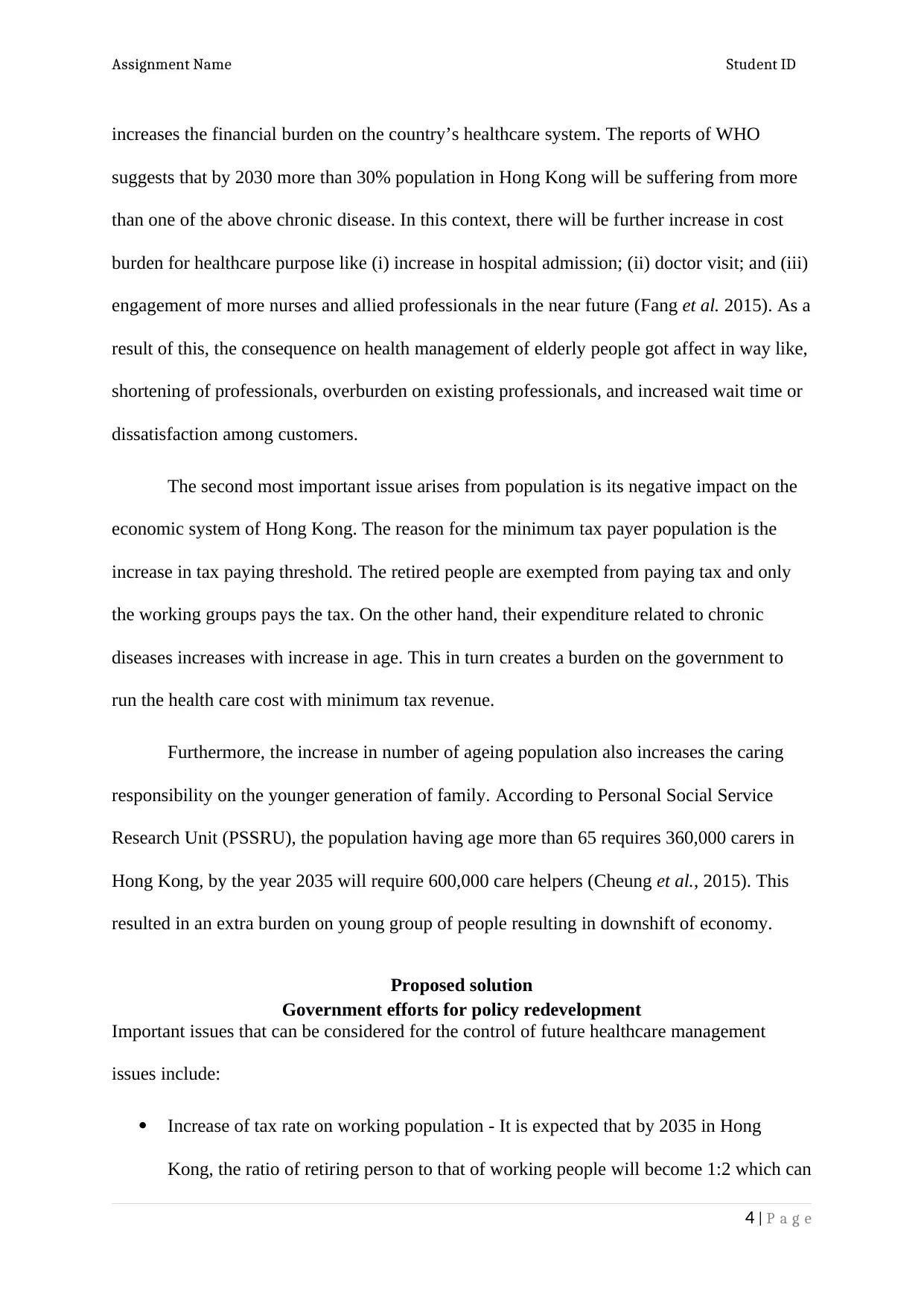
Assignment Name Student ID
increases the financial burden on the country’s healthcare system. The reports of WHO
suggests that by 2030 more than 30% population in Hong Kong will be suffering from more
than one of the above chronic disease. In this context, there will be further increase in cost
burden for healthcare purpose like (i) increase in hospital admission; (ii) doctor visit; and (iii)
engagement of more nurses and allied professionals in the near future (Fang et al. 2015). As a
result of this, the consequence on health management of elderly people got affect in way like,
shortening of professionals, overburden on existing professionals, and increased wait time or
dissatisfaction among customers.
The second most important issue arises from population is its negative impact on the
economic system of Hong Kong. The reason for the minimum tax payer population is the
increase in tax paying threshold. The retired people are exempted from paying tax and only
the working groups pays the tax. On the other hand, their expenditure related to chronic
diseases increases with increase in age. This in turn creates a burden on the government to
run the health care cost with minimum tax revenue.
Furthermore, the increase in number of ageing population also increases the caring
responsibility on the younger generation of family. According to Personal Social Service
Research Unit (PSSRU), the population having age more than 65 requires 360,000 carers in
Hong Kong, by the year 2035 will require 600,000 care helpers (Cheung et al., 2015). This
resulted in an extra burden on young group of people resulting in downshift of economy.
Proposed solution
Government efforts for policy redevelopment
Important issues that can be considered for the control of future healthcare management
issues include:
Increase of tax rate on working population - It is expected that by 2035 in Hong
Kong, the ratio of retiring person to that of working people will become 1:2 which can
4 | P a g e
increases the financial burden on the country’s healthcare system. The reports of WHO
suggests that by 2030 more than 30% population in Hong Kong will be suffering from more
than one of the above chronic disease. In this context, there will be further increase in cost
burden for healthcare purpose like (i) increase in hospital admission; (ii) doctor visit; and (iii)
engagement of more nurses and allied professionals in the near future (Fang et al. 2015). As a
result of this, the consequence on health management of elderly people got affect in way like,
shortening of professionals, overburden on existing professionals, and increased wait time or
dissatisfaction among customers.
The second most important issue arises from population is its negative impact on the
economic system of Hong Kong. The reason for the minimum tax payer population is the
increase in tax paying threshold. The retired people are exempted from paying tax and only
the working groups pays the tax. On the other hand, their expenditure related to chronic
diseases increases with increase in age. This in turn creates a burden on the government to
run the health care cost with minimum tax revenue.
Furthermore, the increase in number of ageing population also increases the caring
responsibility on the younger generation of family. According to Personal Social Service
Research Unit (PSSRU), the population having age more than 65 requires 360,000 carers in
Hong Kong, by the year 2035 will require 600,000 care helpers (Cheung et al., 2015). This
resulted in an extra burden on young group of people resulting in downshift of economy.
Proposed solution
Government efforts for policy redevelopment
Important issues that can be considered for the control of future healthcare management
issues include:
Increase of tax rate on working population - It is expected that by 2035 in Hong
Kong, the ratio of retiring person to that of working people will become 1:2 which can
4 | P a g e
Paraphrase This Document
Need a fresh take? Get an instant paraphrase of this document with our AI Paraphraser
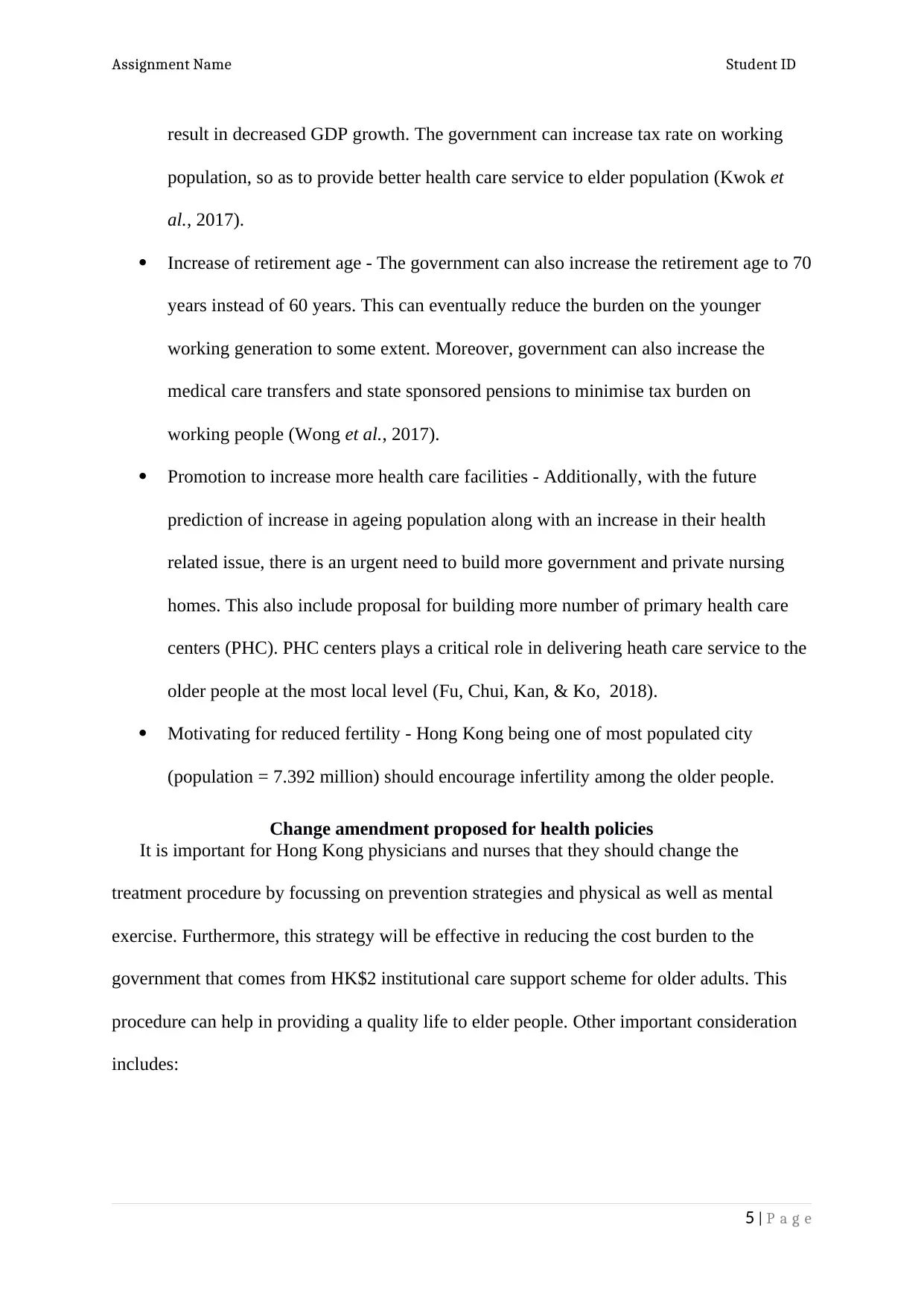
Assignment Name Student ID
result in decreased GDP growth. The government can increase tax rate on working
population, so as to provide better health care service to elder population (Kwok et
al., 2017).
Increase of retirement age - The government can also increase the retirement age to 70
years instead of 60 years. This can eventually reduce the burden on the younger
working generation to some extent. Moreover, government can also increase the
medical care transfers and state sponsored pensions to minimise tax burden on
working people (Wong et al., 2017).
Promotion to increase more health care facilities - Additionally, with the future
prediction of increase in ageing population along with an increase in their health
related issue, there is an urgent need to build more government and private nursing
homes. This also include proposal for building more number of primary health care
centers (PHC). PHC centers plays a critical role in delivering heath care service to the
older people at the most local level (Fu, Chui, Kan, & Ko, 2018).
Motivating for reduced fertility - Hong Kong being one of most populated city
(population = 7.392 million) should encourage infertility among the older people.
Change amendment proposed for health policies
It is important for Hong Kong physicians and nurses that they should change the
treatment procedure by focussing on prevention strategies and physical as well as mental
exercise. Furthermore, this strategy will be effective in reducing the cost burden to the
government that comes from HK$2 institutional care support scheme for older adults. This
procedure can help in providing a quality life to elder people. Other important consideration
includes:
5 | P a g e
result in decreased GDP growth. The government can increase tax rate on working
population, so as to provide better health care service to elder population (Kwok et
al., 2017).
Increase of retirement age - The government can also increase the retirement age to 70
years instead of 60 years. This can eventually reduce the burden on the younger
working generation to some extent. Moreover, government can also increase the
medical care transfers and state sponsored pensions to minimise tax burden on
working people (Wong et al., 2017).
Promotion to increase more health care facilities - Additionally, with the future
prediction of increase in ageing population along with an increase in their health
related issue, there is an urgent need to build more government and private nursing
homes. This also include proposal for building more number of primary health care
centers (PHC). PHC centers plays a critical role in delivering heath care service to the
older people at the most local level (Fu, Chui, Kan, & Ko, 2018).
Motivating for reduced fertility - Hong Kong being one of most populated city
(population = 7.392 million) should encourage infertility among the older people.
Change amendment proposed for health policies
It is important for Hong Kong physicians and nurses that they should change the
treatment procedure by focussing on prevention strategies and physical as well as mental
exercise. Furthermore, this strategy will be effective in reducing the cost burden to the
government that comes from HK$2 institutional care support scheme for older adults. This
procedure can help in providing a quality life to elder people. Other important consideration
includes:
5 | P a g e
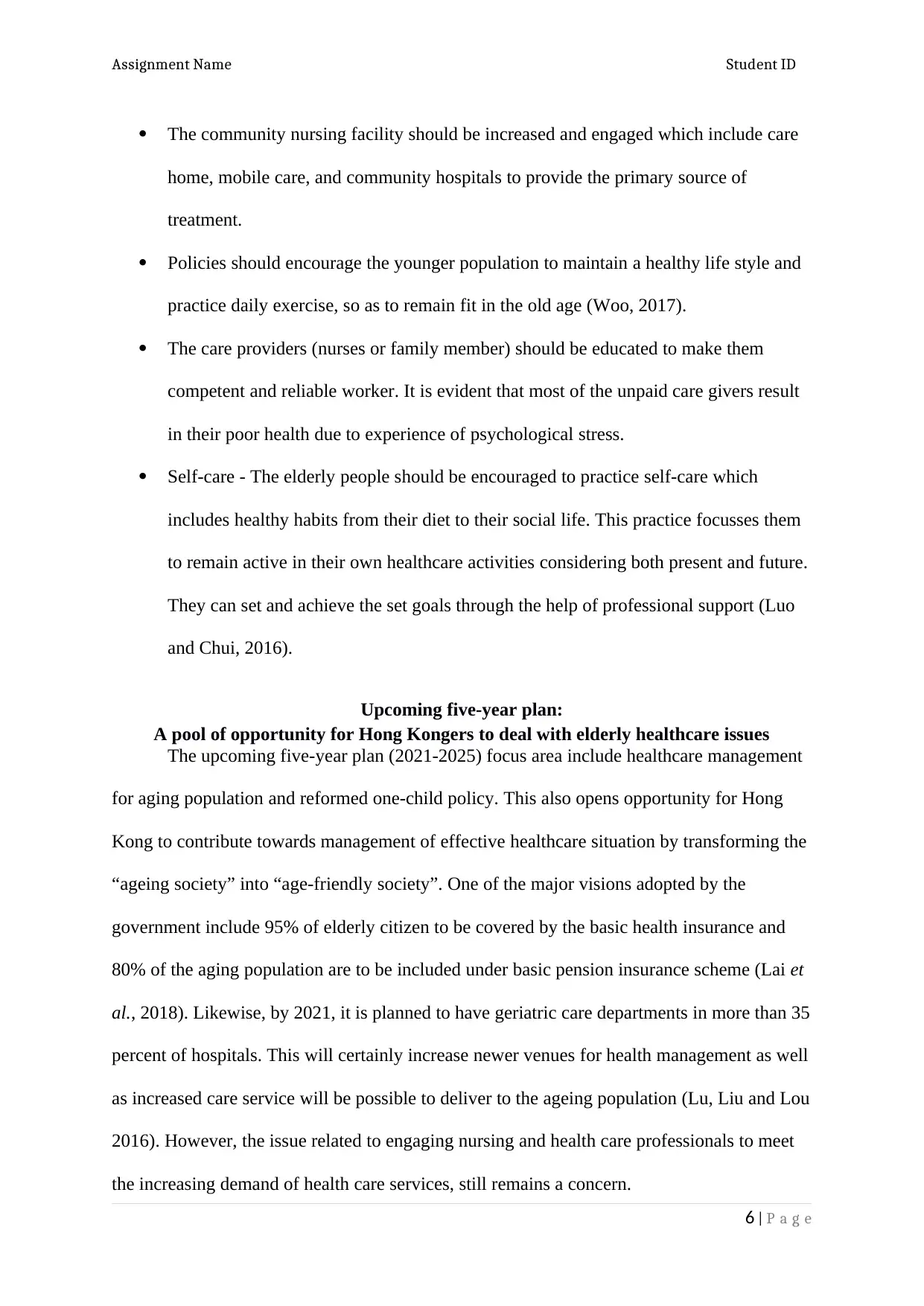
Assignment Name Student ID
The community nursing facility should be increased and engaged which include care
home, mobile care, and community hospitals to provide the primary source of
treatment.
Policies should encourage the younger population to maintain a healthy life style and
practice daily exercise, so as to remain fit in the old age (Woo, 2017).
The care providers (nurses or family member) should be educated to make them
competent and reliable worker. It is evident that most of the unpaid care givers result
in their poor health due to experience of psychological stress.
Self-care - The elderly people should be encouraged to practice self-care which
includes healthy habits from their diet to their social life. This practice focusses them
to remain active in their own healthcare activities considering both present and future.
They can set and achieve the set goals through the help of professional support (Luo
and Chui, 2016).
Upcoming five-year plan:
A pool of opportunity for Hong Kongers to deal with elderly healthcare issues
The upcoming five-year plan (2021-2025) focus area include healthcare management
for aging population and reformed one-child policy. This also opens opportunity for Hong
Kong to contribute towards management of effective healthcare situation by transforming the
“ageing society” into “age-friendly society”. One of the major visions adopted by the
government include 95% of elderly citizen to be covered by the basic health insurance and
80% of the aging population are to be included under basic pension insurance scheme (Lai et
al., 2018). Likewise, by 2021, it is planned to have geriatric care departments in more than 35
percent of hospitals. This will certainly increase newer venues for health management as well
as increased care service will be possible to deliver to the ageing population (Lu, Liu and Lou
2016). However, the issue related to engaging nursing and health care professionals to meet
the increasing demand of health care services, still remains a concern.
6 | P a g e
The community nursing facility should be increased and engaged which include care
home, mobile care, and community hospitals to provide the primary source of
treatment.
Policies should encourage the younger population to maintain a healthy life style and
practice daily exercise, so as to remain fit in the old age (Woo, 2017).
The care providers (nurses or family member) should be educated to make them
competent and reliable worker. It is evident that most of the unpaid care givers result
in their poor health due to experience of psychological stress.
Self-care - The elderly people should be encouraged to practice self-care which
includes healthy habits from their diet to their social life. This practice focusses them
to remain active in their own healthcare activities considering both present and future.
They can set and achieve the set goals through the help of professional support (Luo
and Chui, 2016).
Upcoming five-year plan:
A pool of opportunity for Hong Kongers to deal with elderly healthcare issues
The upcoming five-year plan (2021-2025) focus area include healthcare management
for aging population and reformed one-child policy. This also opens opportunity for Hong
Kong to contribute towards management of effective healthcare situation by transforming the
“ageing society” into “age-friendly society”. One of the major visions adopted by the
government include 95% of elderly citizen to be covered by the basic health insurance and
80% of the aging population are to be included under basic pension insurance scheme (Lai et
al., 2018). Likewise, by 2021, it is planned to have geriatric care departments in more than 35
percent of hospitals. This will certainly increase newer venues for health management as well
as increased care service will be possible to deliver to the ageing population (Lu, Liu and Lou
2016). However, the issue related to engaging nursing and health care professionals to meet
the increasing demand of health care services, still remains a concern.
6 | P a g e
⊘ This is a preview!⊘
Do you want full access?
Subscribe today to unlock all pages.

Trusted by 1+ million students worldwide
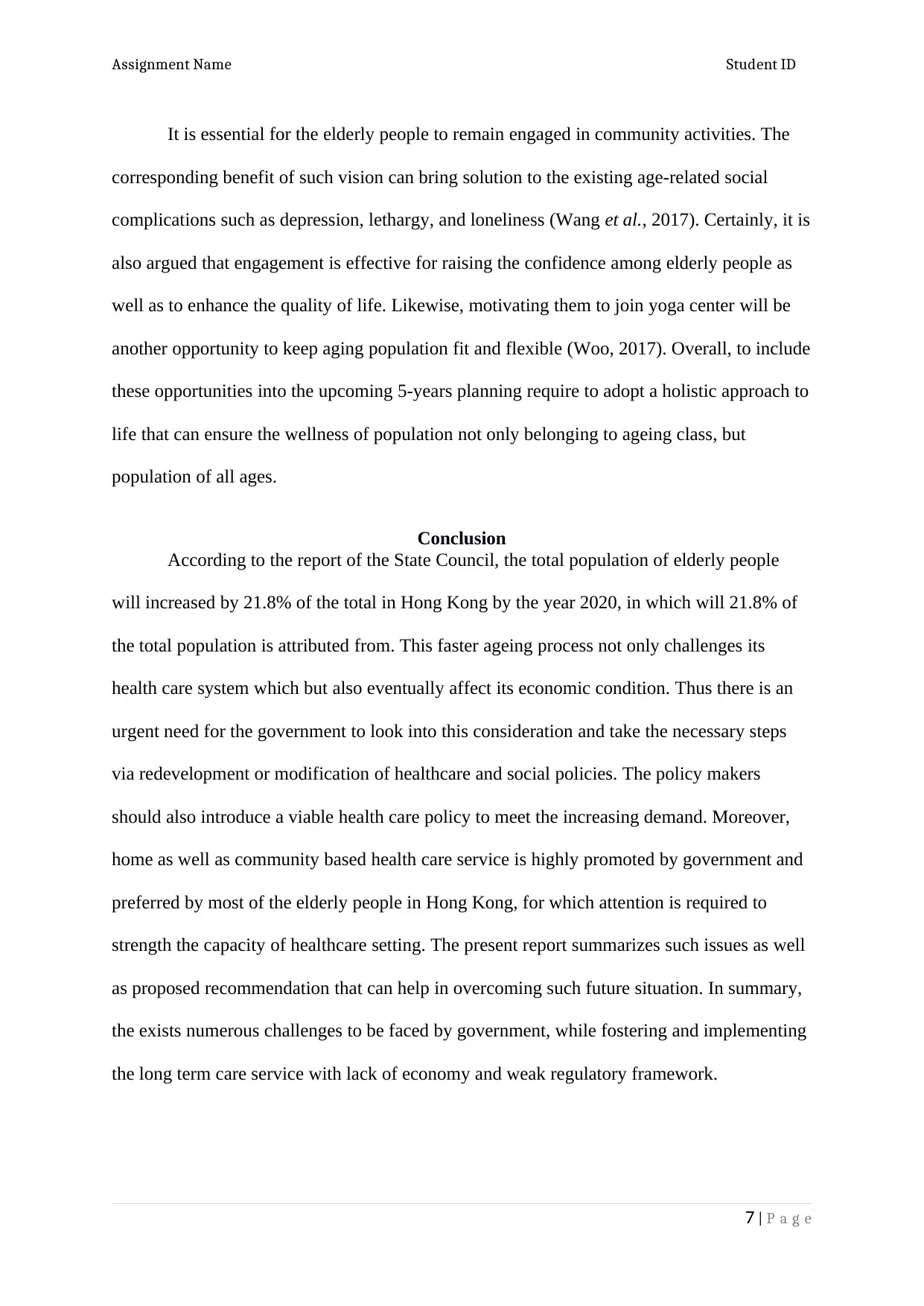
Assignment Name Student ID
It is essential for the elderly people to remain engaged in community activities. The
corresponding benefit of such vision can bring solution to the existing age-related social
complications such as depression, lethargy, and loneliness (Wang et al., 2017). Certainly, it is
also argued that engagement is effective for raising the confidence among elderly people as
well as to enhance the quality of life. Likewise, motivating them to join yoga center will be
another opportunity to keep aging population fit and flexible (Woo, 2017). Overall, to include
these opportunities into the upcoming 5-years planning require to adopt a holistic approach to
life that can ensure the wellness of population not only belonging to ageing class, but
population of all ages.
Conclusion
According to the report of the State Council, the total population of elderly people
will increased by 21.8% of the total in Hong Kong by the year 2020, in which will 21.8% of
the total population is attributed from. This faster ageing process not only challenges its
health care system which but also eventually affect its economic condition. Thus there is an
urgent need for the government to look into this consideration and take the necessary steps
via redevelopment or modification of healthcare and social policies. The policy makers
should also introduce a viable health care policy to meet the increasing demand. Moreover,
home as well as community based health care service is highly promoted by government and
preferred by most of the elderly people in Hong Kong, for which attention is required to
strength the capacity of healthcare setting. The present report summarizes such issues as well
as proposed recommendation that can help in overcoming such future situation. In summary,
the exists numerous challenges to be faced by government, while fostering and implementing
the long term care service with lack of economy and weak regulatory framework.
7 | P a g e
It is essential for the elderly people to remain engaged in community activities. The
corresponding benefit of such vision can bring solution to the existing age-related social
complications such as depression, lethargy, and loneliness (Wang et al., 2017). Certainly, it is
also argued that engagement is effective for raising the confidence among elderly people as
well as to enhance the quality of life. Likewise, motivating them to join yoga center will be
another opportunity to keep aging population fit and flexible (Woo, 2017). Overall, to include
these opportunities into the upcoming 5-years planning require to adopt a holistic approach to
life that can ensure the wellness of population not only belonging to ageing class, but
population of all ages.
Conclusion
According to the report of the State Council, the total population of elderly people
will increased by 21.8% of the total in Hong Kong by the year 2020, in which will 21.8% of
the total population is attributed from. This faster ageing process not only challenges its
health care system which but also eventually affect its economic condition. Thus there is an
urgent need for the government to look into this consideration and take the necessary steps
via redevelopment or modification of healthcare and social policies. The policy makers
should also introduce a viable health care policy to meet the increasing demand. Moreover,
home as well as community based health care service is highly promoted by government and
preferred by most of the elderly people in Hong Kong, for which attention is required to
strength the capacity of healthcare setting. The present report summarizes such issues as well
as proposed recommendation that can help in overcoming such future situation. In summary,
the exists numerous challenges to be faced by government, while fostering and implementing
the long term care service with lack of economy and weak regulatory framework.
7 | P a g e
Paraphrase This Document
Need a fresh take? Get an instant paraphrase of this document with our AI Paraphraser
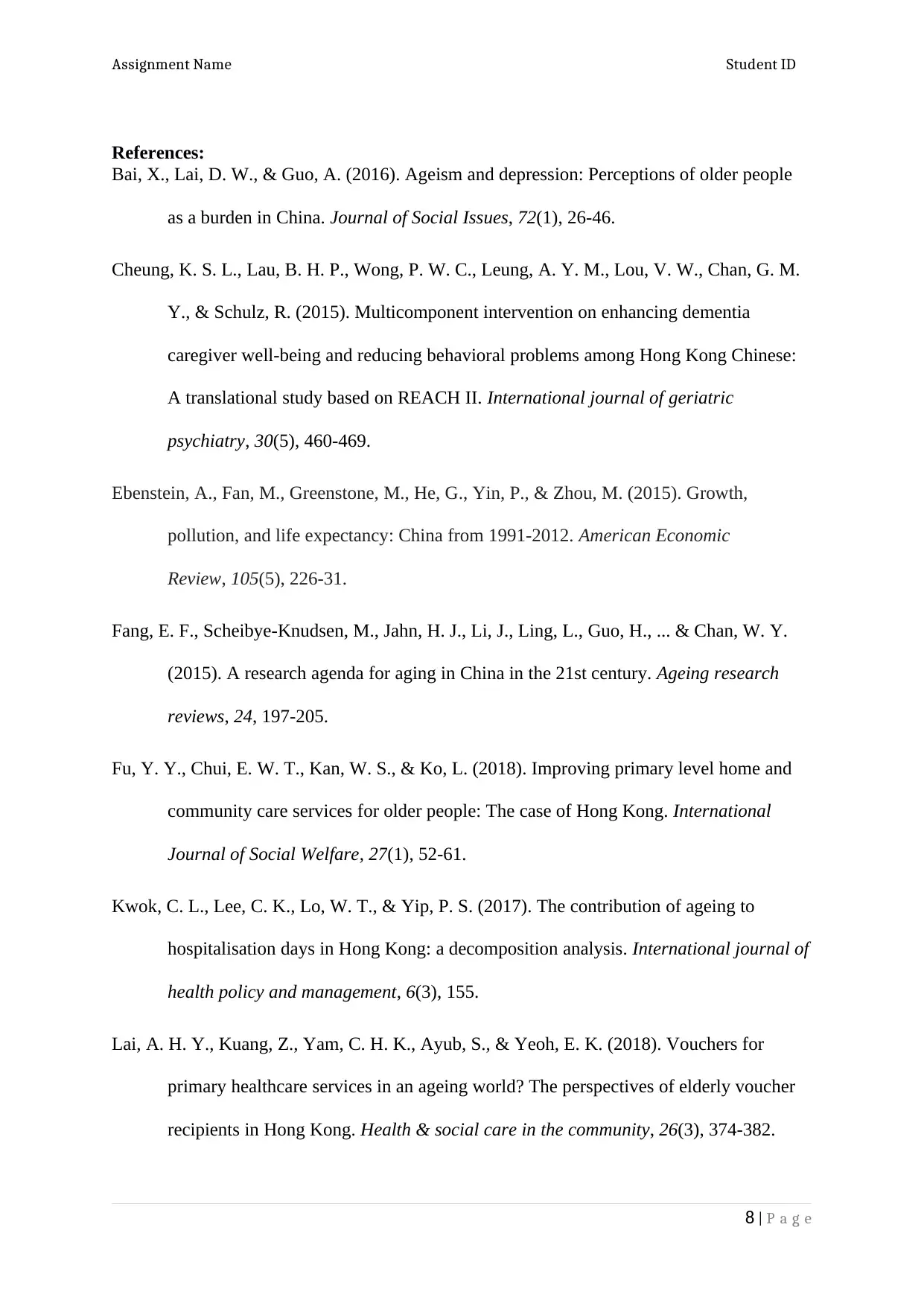
Assignment Name Student ID
References:
Bai, X., Lai, D. W., & Guo, A. (2016). Ageism and depression: Perceptions of older people
as a burden in China. Journal of Social Issues, 72(1), 26-46.
Cheung, K. S. L., Lau, B. H. P., Wong, P. W. C., Leung, A. Y. M., Lou, V. W., Chan, G. M.
Y., & Schulz, R. (2015). Multicomponent intervention on enhancing dementia
caregiver well‐being and reducing behavioral problems among Hong Kong Chinese:
A translational study based on REACH II. International journal of geriatric
psychiatry, 30(5), 460-469.
Ebenstein, A., Fan, M., Greenstone, M., He, G., Yin, P., & Zhou, M. (2015). Growth,
pollution, and life expectancy: China from 1991-2012. American Economic
Review, 105(5), 226-31.
Fang, E. F., Scheibye-Knudsen, M., Jahn, H. J., Li, J., Ling, L., Guo, H., ... & Chan, W. Y.
(2015). A research agenda for aging in China in the 21st century. Ageing research
reviews, 24, 197-205.
Fu, Y. Y., Chui, E. W. T., Kan, W. S., & Ko, L. (2018). Improving primary level home and
community care services for older people: The case of Hong Kong. International
Journal of Social Welfare, 27(1), 52-61.
Kwok, C. L., Lee, C. K., Lo, W. T., & Yip, P. S. (2017). The contribution of ageing to
hospitalisation days in Hong Kong: a decomposition analysis. International journal of
health policy and management, 6(3), 155.
Lai, A. H. Y., Kuang, Z., Yam, C. H. K., Ayub, S., & Yeoh, E. K. (2018). Vouchers for
primary healthcare services in an ageing world? The perspectives of elderly voucher
recipients in Hong Kong. Health & social care in the community, 26(3), 374-382.
8 | P a g e
References:
Bai, X., Lai, D. W., & Guo, A. (2016). Ageism and depression: Perceptions of older people
as a burden in China. Journal of Social Issues, 72(1), 26-46.
Cheung, K. S. L., Lau, B. H. P., Wong, P. W. C., Leung, A. Y. M., Lou, V. W., Chan, G. M.
Y., & Schulz, R. (2015). Multicomponent intervention on enhancing dementia
caregiver well‐being and reducing behavioral problems among Hong Kong Chinese:
A translational study based on REACH II. International journal of geriatric
psychiatry, 30(5), 460-469.
Ebenstein, A., Fan, M., Greenstone, M., He, G., Yin, P., & Zhou, M. (2015). Growth,
pollution, and life expectancy: China from 1991-2012. American Economic
Review, 105(5), 226-31.
Fang, E. F., Scheibye-Knudsen, M., Jahn, H. J., Li, J., Ling, L., Guo, H., ... & Chan, W. Y.
(2015). A research agenda for aging in China in the 21st century. Ageing research
reviews, 24, 197-205.
Fu, Y. Y., Chui, E. W. T., Kan, W. S., & Ko, L. (2018). Improving primary level home and
community care services for older people: The case of Hong Kong. International
Journal of Social Welfare, 27(1), 52-61.
Kwok, C. L., Lee, C. K., Lo, W. T., & Yip, P. S. (2017). The contribution of ageing to
hospitalisation days in Hong Kong: a decomposition analysis. International journal of
health policy and management, 6(3), 155.
Lai, A. H. Y., Kuang, Z., Yam, C. H. K., Ayub, S., & Yeoh, E. K. (2018). Vouchers for
primary healthcare services in an ageing world? The perspectives of elderly voucher
recipients in Hong Kong. Health & social care in the community, 26(3), 374-382.
8 | P a g e
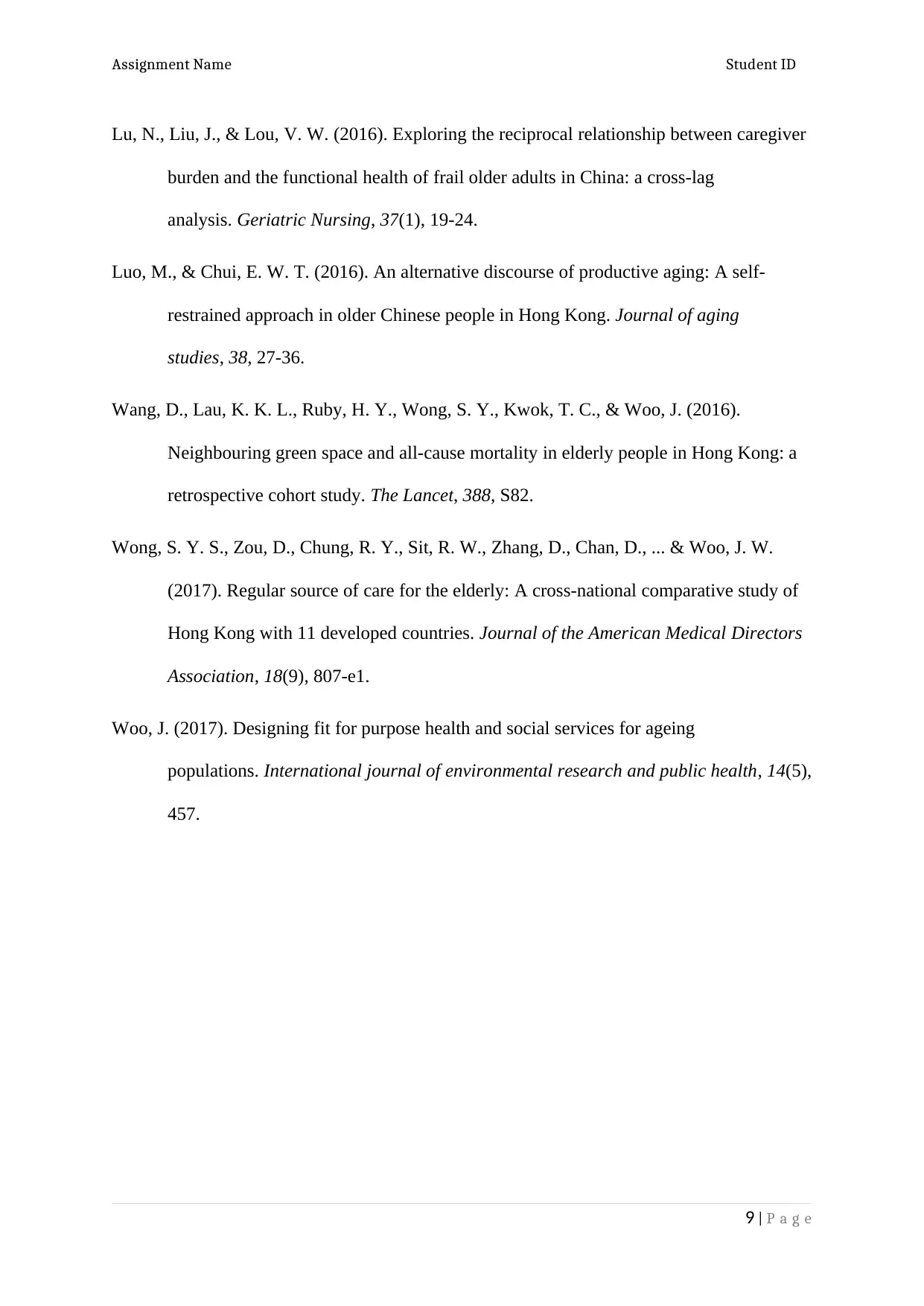
Assignment Name Student ID
Lu, N., Liu, J., & Lou, V. W. (2016). Exploring the reciprocal relationship between caregiver
burden and the functional health of frail older adults in China: a cross-lag
analysis. Geriatric Nursing, 37(1), 19-24.
Luo, M., & Chui, E. W. T. (2016). An alternative discourse of productive aging: A self-
restrained approach in older Chinese people in Hong Kong. Journal of aging
studies, 38, 27-36.
Wang, D., Lau, K. K. L., Ruby, H. Y., Wong, S. Y., Kwok, T. C., & Woo, J. (2016).
Neighbouring green space and all-cause mortality in elderly people in Hong Kong: a
retrospective cohort study. The Lancet, 388, S82.
Wong, S. Y. S., Zou, D., Chung, R. Y., Sit, R. W., Zhang, D., Chan, D., ... & Woo, J. W.
(2017). Regular source of care for the elderly: A cross-national comparative study of
Hong Kong with 11 developed countries. Journal of the American Medical Directors
Association, 18(9), 807-e1.
Woo, J. (2017). Designing fit for purpose health and social services for ageing
populations. International journal of environmental research and public health, 14(5),
457.
9 | P a g e
Lu, N., Liu, J., & Lou, V. W. (2016). Exploring the reciprocal relationship between caregiver
burden and the functional health of frail older adults in China: a cross-lag
analysis. Geriatric Nursing, 37(1), 19-24.
Luo, M., & Chui, E. W. T. (2016). An alternative discourse of productive aging: A self-
restrained approach in older Chinese people in Hong Kong. Journal of aging
studies, 38, 27-36.
Wang, D., Lau, K. K. L., Ruby, H. Y., Wong, S. Y., Kwok, T. C., & Woo, J. (2016).
Neighbouring green space and all-cause mortality in elderly people in Hong Kong: a
retrospective cohort study. The Lancet, 388, S82.
Wong, S. Y. S., Zou, D., Chung, R. Y., Sit, R. W., Zhang, D., Chan, D., ... & Woo, J. W.
(2017). Regular source of care for the elderly: A cross-national comparative study of
Hong Kong with 11 developed countries. Journal of the American Medical Directors
Association, 18(9), 807-e1.
Woo, J. (2017). Designing fit for purpose health and social services for ageing
populations. International journal of environmental research and public health, 14(5),
457.
9 | P a g e
⊘ This is a preview!⊘
Do you want full access?
Subscribe today to unlock all pages.

Trusted by 1+ million students worldwide
1 out of 9
Related Documents
Your All-in-One AI-Powered Toolkit for Academic Success.
+13062052269
info@desklib.com
Available 24*7 on WhatsApp / Email
![[object Object]](/_next/static/media/star-bottom.7253800d.svg)
Unlock your academic potential
Copyright © 2020–2026 A2Z Services. All Rights Reserved. Developed and managed by ZUCOL.





